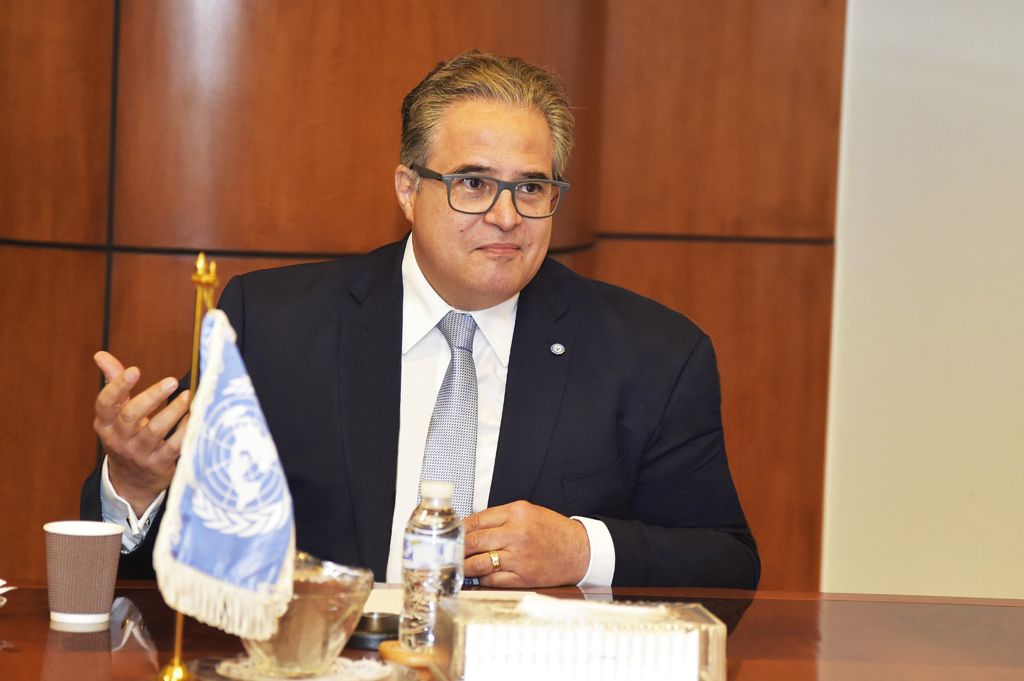Each year the International Day of Peace is observed around the world on 21 September. The UN General Assembly has declared this as a day devoted to strengthening the ideals of peace, through observing 24 hours of non-violence and cease-fire. The 2021 theme for the International Day of Peace is “Recovering better for an equitable and sustainable world” as it stresses on the need to think creatively and collectively about how to help everyone recover better, how to build resilience, and how to transform our world into one that is more equal, just, equitable, inclusive, sustainable, and healthier, especially in lights of COVID-19 outbreak.
In a video recorded by the Secretary-General Mr. António Guterres, he stated that “This year’s International Day of Peace comes at a crisis point for humanity. COVID-19 has turned our world upside-down; conflicts are spinning out of control; the climate emergency is worsening; inequality and poverty are deepening, and mistrust and division are driving people apart at a time when solidarity and collaboration are needed more than ever. As a human family, we face a stark choice — Peace or perpetual peril … We must choose peace.”
The State of Kuwait has been and remains to be a global cornerstone in the maintenance and promotion of the culture of peace in its internal and external policy, which was evident through its relentless efforts and tireless work in promoting peace and security in the region and beyond. Kuwait spared no effort in taking decisions, especially in issues of concern to the Arab region and maintaining international peace and security. Kuwait reaped the fruits of its labors in solving the Gulf crisis after 3 years of its role as a mediator calling for an end to the Gulf crisis. Besides its leading efforts during its non-permanent membership at the United Nations Security Council, during which it ensured promotion of the culture of peace through drafting and proposing many resolutions calling for ceasefire in Syria, namely the resolution which was proposed on September 19th 2019, when the State of Kuwait, alongside Kingdom of Belgium and Federal Republic of Germany, as the penholders of the Syrian humanitarian file, produced a resolution aiming for an immediate cease to hostilities in the Governorate of Idlib, Syria, and requiring all parties to adhere to international humanitarian laws.
In a statement by, Dr. Tarek Elsheikh, Representative of the United Nations Secretary-General and Resident Coordinator in the State of Kuwait commended Kuwait for its long-lasting position in promotion of peace “The State of Kuwait serves as a global role-model for the promotion of peace. It has proved in multiple instances that the solution to the global challenges the world is facing, namely our region, is peace. The State of Kuwait promotes the culture of peace through encouraging dialogue between rival parties as was demonstrated during its hosting of the Yemen Peace Talks and providing urgent humanitarian aid as was demonstrated during the past years to the Syrian and Yemeni humanitarian crises.”
Global Peace Index (GPI) 2021 – Measuring Peace in a Complex World
The Global Peace Index (GPI) is an effort by the Institute for Economics and Peace to measure the degree of peacefulness in countries across the global and rank them accordingly. The first list was created in 2007 and has since then been published annually. The index includes a number of indicators relating to both domestic and international peacefulness. The GPI is the world’s leading measure of global peacefulness.
The 2021 edition of the Global Peace Index ranks 163 independent states and territories according to their level of peacefulness. Produced by the Institute for Economics and Peace (IEP), The report presents comprehensive data driven analysis on trends in peace, its economic value, and how to develop peaceful societies.
The average level of global peacefulness deteriorated by 0.07 per cent. This is the ninth deterioration in peacefulness in the last thirteen years, with 87 countries improving, and 73 recording deteriorations; however, the change in score is the second smallest in the history of the index. The 2021 GPI reveals a world in which the conflicts and crises that emerged in the past decade have begun to abate, only to be replaced with a new wave of tension and uncertainty as a result of the COVID-19 pandemic and rising tensions between many of the major powers.
Only three of the nine regions in the world became more peaceful over the past year. The largest improvement occurred in the Middle East and North Africa (MENA), followed by Europe and South Asia. However, MENA still remains the least peaceful region in the world. An improvement in the level of Ongoing Conflict in MENA was the biggest driver of increased peacefulness, with every indicator on the domain, recording an improvement.
Qatar and Kuwait were the most peaceful countries in Middle East and North Africa (MENA) region, and also among the GCC countries according to the 2021 GPI results. Kuwait score has improved compared to the previous year and the country’s place moved up significantly in the global ranking form 42nd in 2018 to 36th in 2021.
The International Day of Peace was established in 1981 by the United Nations General Assembly. Two decades later, in 2001, the General Assembly unanimously voted to designate the Day as a period of non-violence and cease-fire.

